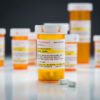People on short-term corticosteroids use even for a relatively very short period of time were more likely to break a bone, have a blood clot or develop sepsis compared to those who didn’t take the medication, according to results of a new study.
Researchers examined data from 1.5 million non-elderly American adults. Over the 3-year study period, about 20% of them filled a short-term prescription for an oral corticosteroid, such as prednisone. Rates of serious adverse events were highest in the first 30 days after receiving a prescription, the researchers reported in the BMJ. Even more concerning, the risk of such events was still high 3 months later.
“We see a clear signal of higher rates of these 3 serious events within 30 days of filling a prescription,” lead study author Akbar Waljee, MD, of the University of Michigan School of Medicine, said in a statement. “We need to understand that short-term corticosteroid use do have a real risk and that we may use them more than we really need to.”
Results also indicated that around half of the people that received an oral steroid got the drug for 6 diagnoses related to back pain, allergies or respiratory tract infections.
Waljee also advised that doctors prescribe and patients use the lowest amount of corticosteroid possible. “If there are alternatives to steroids, we should be using those when possible,” he added.






